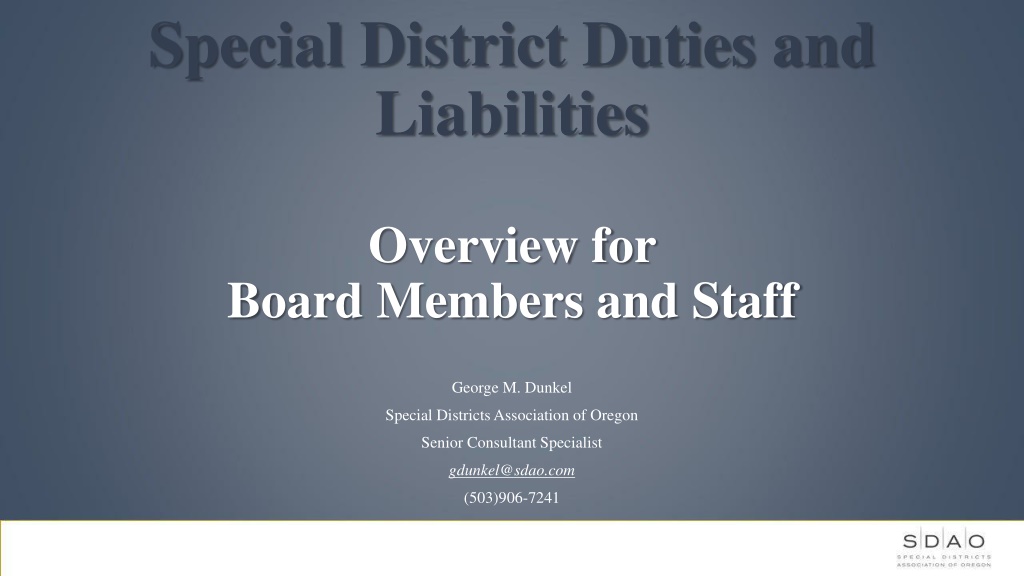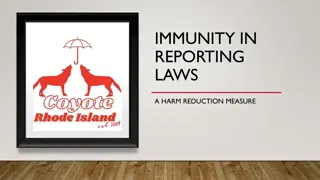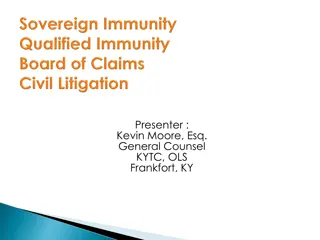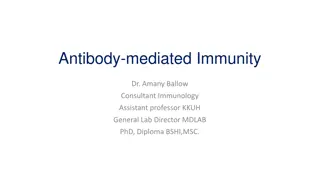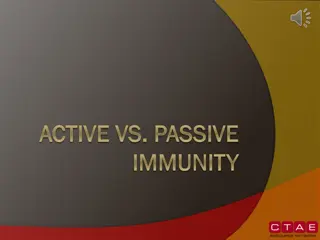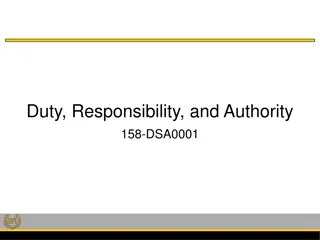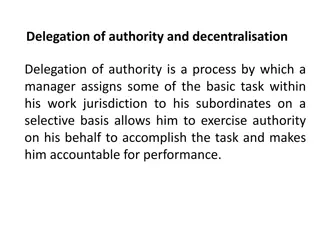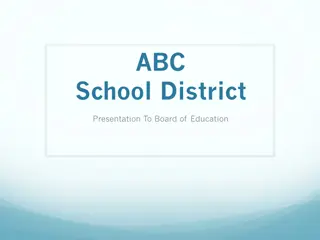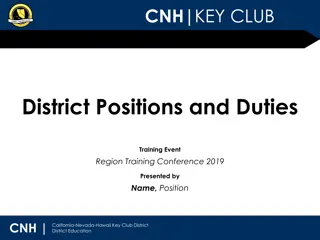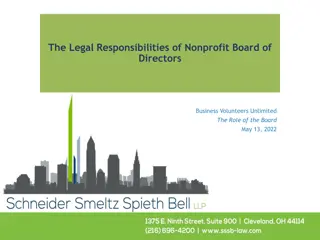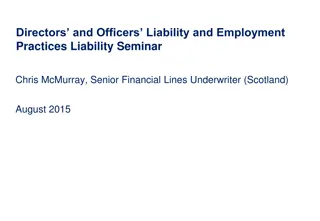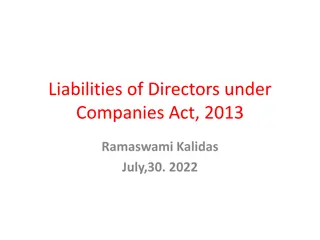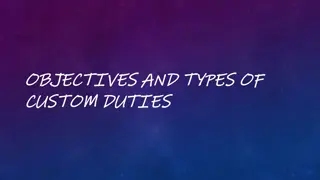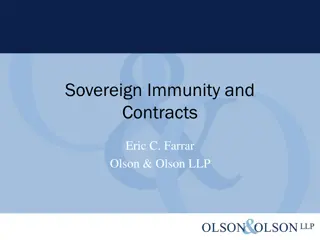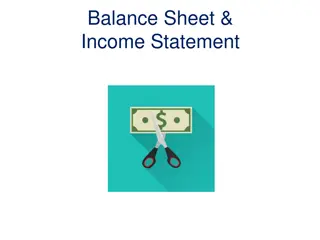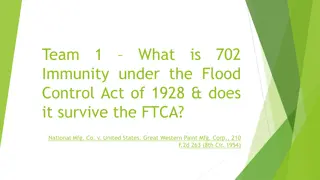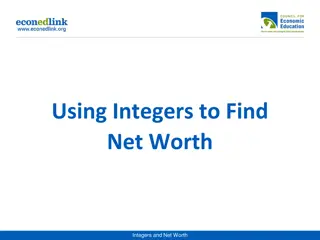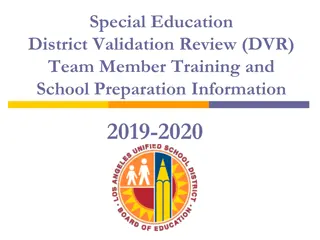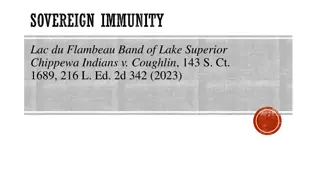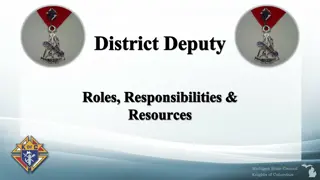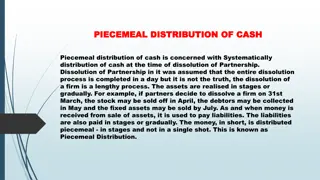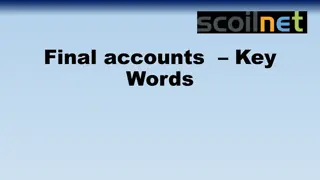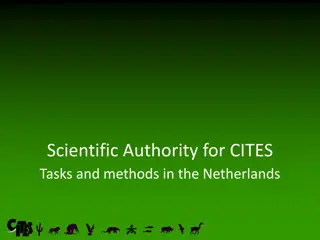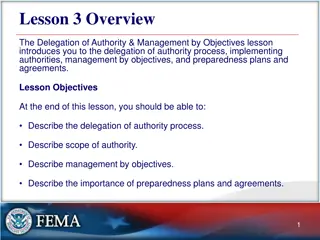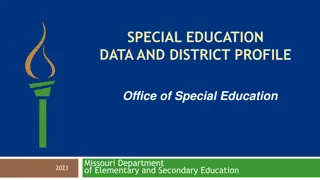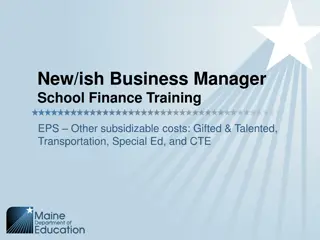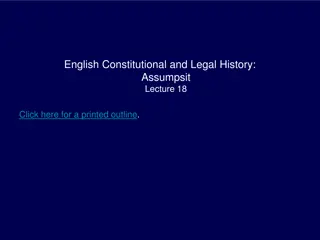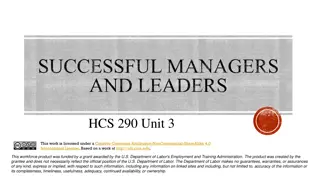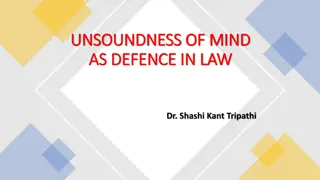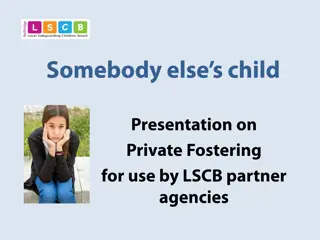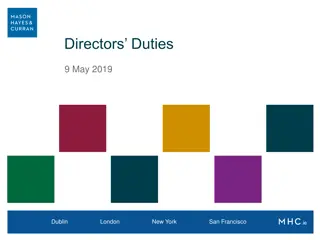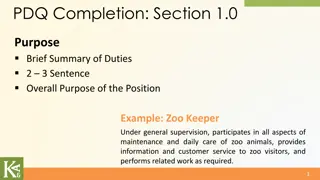Special District Duties and Liabilities Overview: Authority, Immunity, and Actions
This overview covers the authority, immunities, and actions pertinent to board members and staff in special districts, focusing on powers, protections, expressly provided and necessarily implied authority, limitations, and legal protections, including sovereign immunity and legal actions against public bodies.
Download Presentation

Please find below an Image/Link to download the presentation.
The content on the website is provided AS IS for your information and personal use only. It may not be sold, licensed, or shared on other websites without obtaining consent from the author. Download presentation by click this link. If you encounter any issues during the download, it is possible that the publisher has removed the file from their server.
E N D
Presentation Transcript
Special District Duties and Liabilities Overview for Board Members and Staff George M. Dunkel Special Districts Association of Oregon Senior Consultant Specialist gdunkel@sdao.com (503)906-7241
Powers and Protections
Authority of the District Authority of the Board Sovereign immunity
Authority of the District Dillon s Rule A local government may exercise powers that are expressly provided for by law or are necessarily implied.
Expressly provided authority: ORS Chapter 198 Principal Act of District Other statutes, e.g.: Elections (ORS Ch. 255) Bonds (ORS Ch. 280) Contracts (ORS Ch. 279A, B, C) Administrative Rules Ordinances
Necessarily implied authority, e.g.: Purchasing supplies Employing staff Entering into contract Incidental tasks relating to exercise of authority
Authority of the Board Individual Board do not have any power to engage in any of the following tasks without the consent of the majority of the Board: Establish policies Review personnel records Direct staff Sign contracts. Represent the District at Events?
Board Action: Must be at a properly called public meeting Requires a quorum to be present Generally requires approval by a majority of the board All votes must be taken publicly (no secret ballots)
Sovereign Immunity Prohibits a government body from being sued unless the sovereign (e.g., the state of Oregon) grants permission to do so through legislation The legislation may dictate the method and terms of the suit
Legal Protections: Legal actions against public bodies [ORS 30.320]: Contracts: Treated like any private party. Quiet title: Treated like any private party. Tort: Only as provided in ORS 30.260 to 30.300 [Oregon Tort Claims Act]
Oregon Tort Claims Act: Subject to the limitations of ORS 30.260 to 30.300, every public body is subject to action or suit for its torts and those of its officers, employees and agents acting within the scope of their employment or duties . The sole cause of action for any tort of officers, employees or agents of a public body acting within the scope of their employment or duties shall be an action against the public body only No other form of civil action or suit shall be permitted.
If someone brings a tort action against officers, employees or agents acting with the scope of their duties and alleges damages equal to or less than the tort claim damage caps, the sole cause of action is against the public body. However, if the amount of damages claimed exceeds the damage caps, the action may be maintained against the individual defendant(s), whether or not the public entity is a named defendant. Damage caps still apply to the claim against the individual defendant(s).
Board Roles and Responsibilities
Board Roles and Responsibilities Board Qualifications: Must be qualified to serve in the District (usually elector or resident) Volunteer public officials may hold an unlimited number of unpaid offices
Special district Board members can be compensated up to $50/day or portion thereof, and be reimbursed for expenses Elected board members can be recalled, but usually can t otherwise be removed
Entitled to indemnity under OTCA for claims of negligence against Board Not entitled to indemnity if acting outside course and scope
Can be found personally liable for repayment of unlawful expenditure of public funds. (ORS 294.100) Can become ineligible for public office if a member of, or affiliated with, any organization which teaches the doctrine of, or advocates, the overthrow of the Government of the United States by force or violence. (ORS 236.030)
Office becomes vacant if board member: Dies or resigns; Ceases to be an inhabitant of the entity for which he or she was elected or appointed, if this is required;
Is convicted of an infamous crime, or any offense involving the violation of the oath of the incumbent. Refuses or neglects to take the oath of office, or to give or renew the official bond of the incumbent, or to deposit such oath or bond within the time prescribed by law
Has election or appointment declared void by a competent tribunal; Is found to be a mentally diseased person by a competent tribunal;
Ceases to possess any other qualification required for election or appointment to such office (ORS 236.010); or Agrees to engage in, or does engage in, a duel, or curry a challenge to a duel to another person. (Or. Const. Art. II, Section 9).
Board decision-making: Regular voting procedures Affect day-to-day operations Recorded in the minutes No other documentation necessary Resolution Establishes formal policy of board. Governs internal operations Simple adoption procedures Ordinance Local law. Requires statutory authority Formal adoption procedures
Resolutions: Written record of important board decisions and district policy May be required by statute Simple adoption requirements Included in published meeting agenda Must be approved by majority of board
Non-emergency ordinance: Notice published in a newspaper of general circulation 4-10 days before the meeting, stating the time, date and place of the meeting, giving a brief description of the ordinance to be considered, and stating that copies are available at the district office. May also be posted in three public places within the district at least 10 days before the meeting; or published by radio and television stations broadcasting in the district [see ORS 193.310 and 193.320]. Must be read during regular meetings of the district board on two different days at least six days apart. (Wait. There s more.)
Reading must be full and distinct unless, at the meeting: A copy of the ordinance is available for each person who desires a copy; and The board directs that the reading be by title only. Requires affirmative vote of a majority of the members of the district board. (Keep going.)
Within seven days after adoption: Signed by the presiding officer; Attested by the recording secretary of the district board at the session at which the board adopted the ordinance; and Filed in the records of the district. A certified copy filed with the county clerk, available for public inspection. Unless referred to electors, takes effect on the 30th day after it is adopted, unless a later date given in the ordinance. (Not done yet.)
Emergency ordinance: May be adopted after a single reading Takes effect immediately upon adoption Must state nature of emergency Requires unanimous approval, a quorum being present Notice must be published within fifteen (15) days of adoption (That s enough about ordinances.)
Board Vision, Mission and Values Vision: What does the District strive to be? How do we want to be seen? Mission: Why does the District exist? What services do we provide? Values: What are our guiding principles? What are our standards for conduct and ethics?
Board Member Expectations Board members should: Be prepared and informed. Be honest and courteous. Be respectful of each other and the District. Be on time. Be friendly. Be courageous. Represent the board s position/action. Understand your and others roles and responsibilities.
Board Expectations of CEO/Manager The CEO/Manager should be expected to: Be prepared and informed. Provide options. Make recommendations. Provide organized board packets. Communicate; no surprises. Be honest. Be friendly. Represent the board s actions.
Legal Authorities The Oregon Government Ethics Commission (OGEC) is the administrative agency that enforces Oregon s ethics laws. OGEC created in 1974 by a state-wide ballot measure following the Watergate scandal. Ethics laws for public officials were enacted at the same time.
Oregon Revised Statutes (ORS) Chapter 244. Oregon Ethics Commission s Guide for Public Officials.
Scope of Ethics Law Not morals. Economic conflicts of interest. Undue influence. Use of political office for financial gain. Public disclosure.
Apply to all public officials and candidates. Any person serving the state of Oregon or any of its political subdivisions or any other public body of the state as an elected official, appointed official, employee, agent, irrespective of whether the person is compensated for the services. ORS 244.020(14). Includes current and former board members, employees, volunteers, and candidates for public office.
Also relatives of public officials: Spouse, parent, stepparent, child, sibling, stepsibling, son-in-law, daughter-in-law of the public official, or of the public official s spouse. (Now also includes First Person, to include the spouse or partner of the Governor). Any individual for whom the public official has a legal support obligation; or who benefits financially from the public official s employment with the public entity.
Nepotism Can I hire my relative? No. A public official may not participate in employment decisions regarding relatives or household members. Includes interviews, debates, or discussions regarding the hiring or firing of relatives or household members.
Can I supervise my relative? No, a public official may not directly supervise relatives or household members.
Two exceptions: 1. The class exception: If the public official s action affects a class of people (including his/her relative) to the same degree, then the nepotism provisions are not violated. 2. The unpaid volunteers exception: Generally, nepotism provisions do not apply to employment decisions regarding unpaid volunteers (who are not board members). Also, a public official may serve as a reference or provide a recommendation for a relative.
Financial Gain The but for test. A public official shall not use the official position to obtain financial gain or avoid financial detriment that would not otherwise be available but forthe public official s position. ORS 244.040. Applies to the public official, a relative of the public official, or a business owned by the public official or the public official s relative.
Examples of unlawful financial gain: Using district equipment (e.g. phones, computers, wood shop tools, vehicles, or storage space) when the public does not have the same access. Free use of district facilities when the public is required to pay to use them. Someone buying meals or waiving entry fees for public officials. Employer-provided cell phones for personal use, frequent flier miles earned on official business, discounts -- unless part of compensation.
Exceptions to but-for test (for most public officials), i.e., okay to receive. Official compensation package. Reimbursement of expenses. An honorarium, certificate, plaque, commemorative token or other item with a value of $50 or less. An honorarium for services performed in relation to the public official s private profession, occupation, avocation or expertise.
Food, beverage, travel or lodging expenses otherwise authorized by ethics laws for a speaking engagement or presentation. An unsolicited award for professional achievement. Gifts from a source that could not reasonably be known to have a legislative or administrative interest. Gifts from a source that could reasonably be known to have a legislative or administrative interest but that do not exceed $50.
Items of any kind, regardless of value, that are excluded from the definition of gift in ORS 244.020. Contributions to the official s legal expense trust fund.
Gifts General rule A public official (or a relative, or a business of the public official) may not receive a gift valued at greater than $50 from someone with a legislative or administrative interest in the public body. What s a gift ? Something given to a public official, or a relative of the public official, when there is no payment, or payment is for a discounted price, and the opportunity (gift) is not available to others who are not public officials on the same terms or conditions.
What is a legislative or administrative interest? With respect to the public body, can the giver: sell things? submit bids? get a license or permit? advocate for legislative outcomes (i.e., lobby)? be affected by employment decisions?
Is entertainment a gift? Yes, entertainment gifts include invitations to events or activities put on for recreation or amusement (e.g. concerts, plays, sporting events). If not an incidental part of another event (such as a conference) and provided by someone with a legislative or administrative interest in the public body, the $50 annual limit applies.
What about meals and beverages? Food and beverages consumed in the presence of the buyer is subject to the $50 limit. However, you may accept food and beverage at a reception when it is an incidental part of the reception. Also, food or beverage consumed at the event when the public official represents the public entity is not a gift.
Permissible gifts? Gifts of any value if the giver does not have a legislative/administrative interest in the public entity. Gifts of $50 or less from a single source with a legislative/administrative interest in the public entity. Gifts that bear no relationship to the person s public position.
Informational or program material, publications or subscriptions related to the recipient s performance of official duties. Reasonable food, travel, and lodging expenses paid for the public official, accompanying relatives, and staff when a public official is representing the public entity on approved official business.
